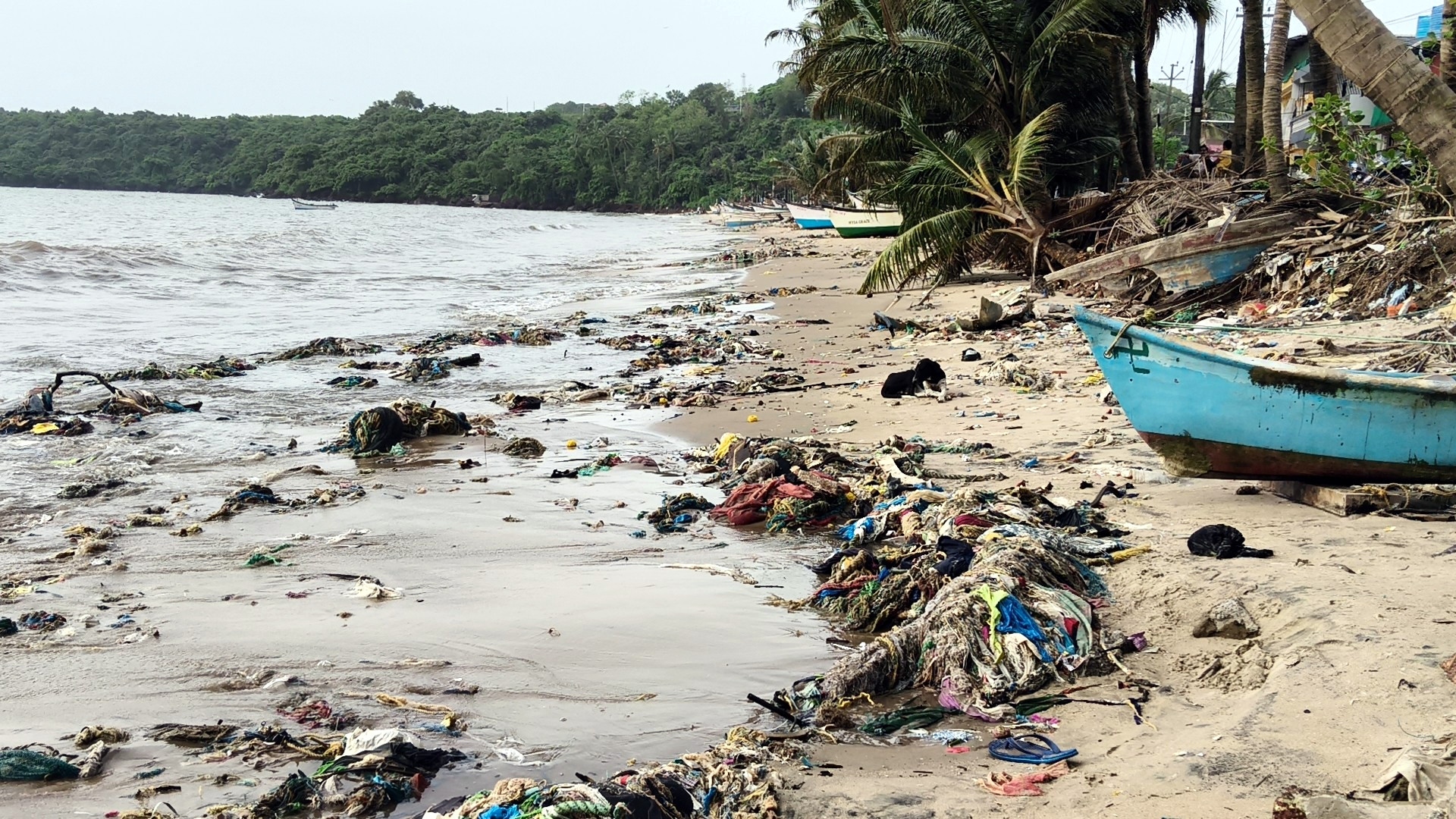
Kharewaddo beach lies forgotten and buried under piles of garbage and human waste, with fishermen still using what little remains of the beach.
VASCO
There are dozens of beaches in the State and yet, how many tourists or even Goans have heard of Kharewaddo beach?
Once a picturesque shoreline in the heart of Vasco, Kharewaddo beach today lies forgotten, buried under piles of garbage, ignored by successive governments, and threatened by both human negligence and industrial expansion.
Fondly remembered by elders as a vibrant stretch where footballs flew and fishing nets dried under the sun, the beach is now reduced to a narrow strip, reeking more of neglect than nostalgia.
While Goa’s beaches have attracted global attention, Kharewaddo has quietly slipped off the map — not because it’s tucked away, but because it’s disappearing in plain sight.
Buried under garbage
Decades ago, Kharewaddo beach was the pride of Vasco — a community space where fishermen anchored their canoes and families strolled by the sea. Today, it paints a very different picture. The shoreline is strewn with garbage, human waste, and plastic debris. The fishermen still use what little remains of the beach, treading cautiously through the filth to offload their fresh catch, but even their resilience is wearing thin.
“There used to be a time when children played volleyball on this very sand after returning from the sea. Now, we just look the other way and hope no one remembers what this place once was,” said a local senior citizen.
Residents lament that the current generation — even those living nearby — hardly know of the beach’s existence.
“It’s not just a beach that’s disappearing, it’s a memory, a culture, and a part of Vasco’s soul that is being erased,” remarked another resident.
Many initiatives, little impact
Over the years, Kharewaddo beach has often found itself at the centre of political discussions, especially around elections.
In 2018, political rivals surprisingly joined hands for a cleanliness drive at Kharewaddo beach on Gandhi Jayanti, responding to a challenge floated on the “Shepherds of Vasco” WhatsApp group. The event saw participation from then MLA Carlos Almeida, former minister Jose Philip D’Souza, and present MLA Krishna Daji Salkar, along with MMC councillors and over 200 volunteers.
But like many such initiatives, the impact was short-lived. Similar drives were undertaken in 2019 by the group “Ugly Goans” in 2020 by concerned residents, and in 2022 by JCI Vasco in association with local clubs. Yet, the filth always returned, and no sustained effort followed.
In May 2024, the fisheries department organised a promising awareness session on marine plastic pollution, but again, no long-term commitment to cleaning or restoring the beach emerged.
“Announcements are made, inspections are held, but the beach goes back to being a dump yard the moment the cameras are turned off,” said a disheartened resident.
Beach eyed by industry
Adding to the community’s fears is the looming presence of the Mormugao Port Authority (MPA), whose expansion plans include the Kharewaddo bay. Locals allege that capital dredging by MPA to accommodate larger vessels has led to severe sand erosion along the Kharewaddo coastline. “It all began when the MPA started deepening the sea channels. The beach began to shrink, and we knew it would only get worse. Some of us even approached the courts, fearing our homes would be swallowed by the sea,” said a resident.
The erosion is visibly advancing. Fishermen have claimed that new infrastructure projects by MPA offer token gestures like jetties in return for complete control over the Kharewaddo bay — a move they believe will erase the beach from the city’s map altogether.
Unkept promises, fading hope
Despite public appeals and media attention, promises to restore Kharewaddo beach have largely remained on paper.
In 2018, leaders from all major political parties demanded the beach’s revival. Vasco MLA Krishna Salkar acknowledged its deteriorating condition and urged citizens to unite for its preservation. Former minister Jose Philip D’Souza spoke emotionally about his childhood spent on the same sand and urged MMC to clean the beach regularly.
Goa’s environmental voices have also raised concerns. GRE General Secretary Olencio Simoes demanded beach nourishment measures and lifeguard towers. “Why should tourists see filth when their cruise ships dock here? Kharewaddo deserves better,” he stated.
In 2022, Salkar conducted a joint inspection with the tourism department and asked for immediate clean-up and illumination of the beach. There were plans to revive Kharewaddo in phases. However, like earlier pledges, these too faded into obscurity.
Reclaiming lost identity
Kharewaddo’s story is one of missed opportunities and fading civic memory. As Vasco grows, its only beach is on the verge of vanishing, both physically and emotionally.
Locals suggest that the beach could have been an economic asset — lined with shacks serving local seafood, drawing tourists, and providing jobs. Instead, it now houses makeshift structures for migrant labourers and remains plagued by waste and decay. With excellent road, rail, sea, and air connectivity, Vasco is well-positioned to support tourism. A restored Kharewaddo beach could be a jewel in the city’s crown — if only the will existed. For now, the waves continue to wash ashore more garbage than hope. And with every tide, Kharewaddo slips further away, a beach not just forgotten by tourists, but by its very own people.